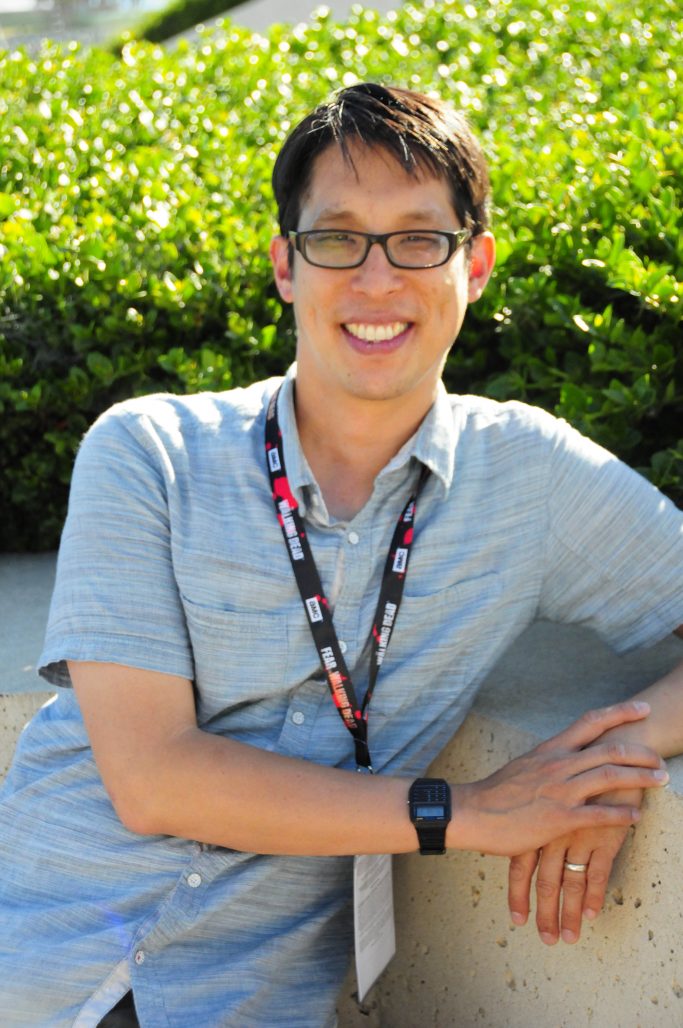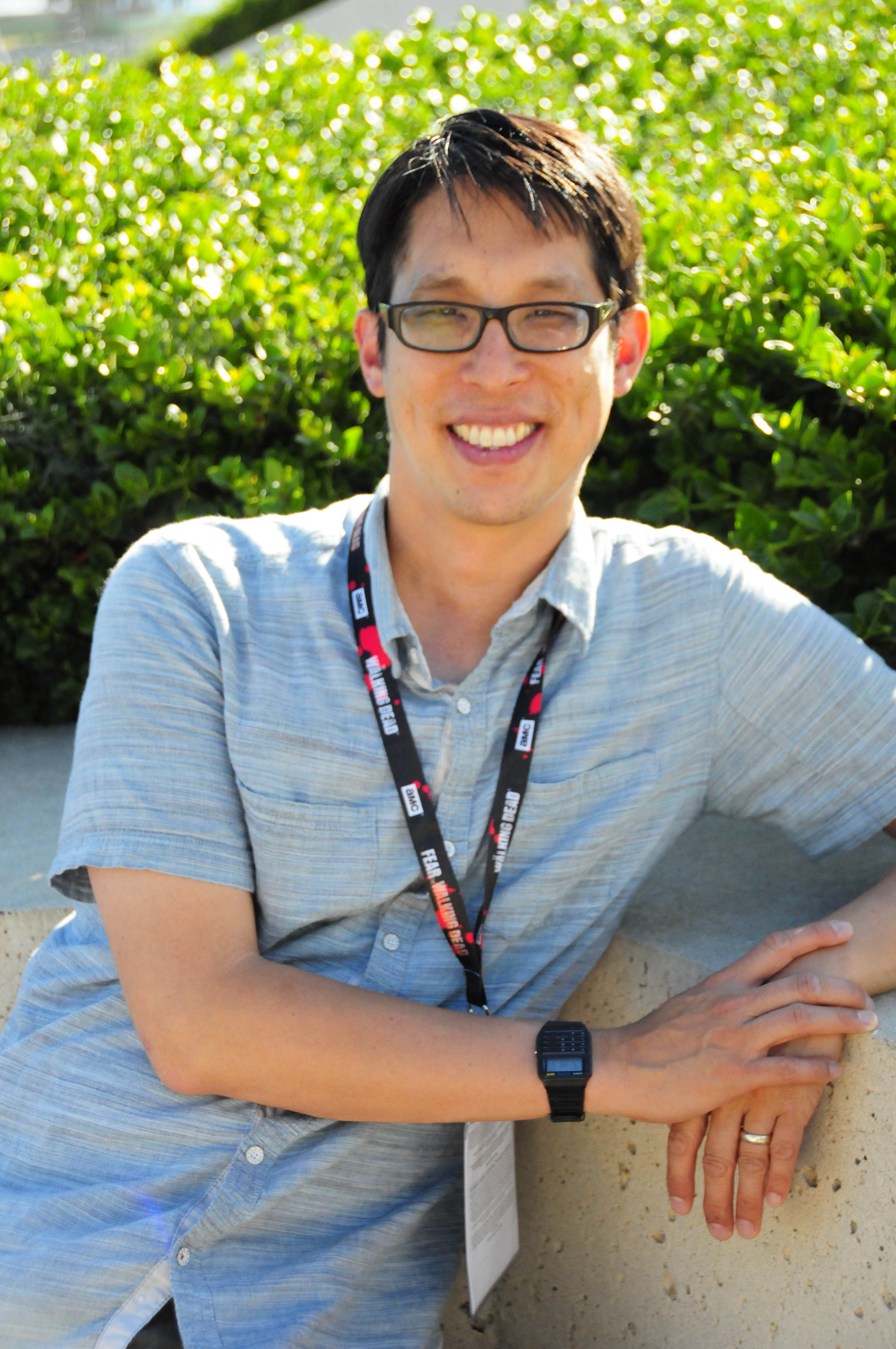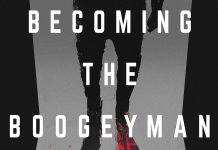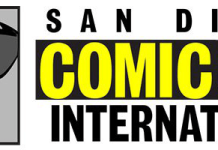
By: Nicholas Eskey
As one of the most influential graphic novel publishers in the United States, First Second is proud to celebrate 2016 as their their 10-year anniversary. Known for publishing noteworthy stories that also spark conversations, the publisher also does well with making strong connections with their writers and artists.
One such writer is Gene Luen Yang, who first published his award winning “American Born Chinese” with First Second in 2006, and then gained more notoriety with his later work “The Eternal Smile” in 2009. For this year’s San Diego Comic-Con, Gene is present as a special guest, carrying now the title of “National Ambassador for Young People’s Literature.” I was grateful for the opportunity to interview this important writer at SDCC and speak more about his new role.
Thank you Gene, the National Ambassador for Young People’s Literature, for the interview. So, I have to ask, what does that title mean?
Well first, it’s the job with the longest title I’ve ever held. The National Ambassador for Young People’s Literature position was created in 2008. Every ambassador has a two-year term, and I’m the fifth one. The whole point of it is to both get kids to read more, and more kids reading.
Do you see an issue with kids not reading nowadays?
It seems like it, it seems like it. They do these studies and it does seem that kids are reading less and less. I feel this in my own life, that there just is so much competing for our attention. It does seem that it’s hard to set aside time for reading.
Well I also think that kids are learning poor grammar from texting and Twitter. Haha.
There is that. But there’s also a hunger for more stories than ever. It seems that we as a species are consuming more and more stories. I would like us, especially our kids, to consume more of those stories in book form.
Do you believe that this hunger for stories is because parents are afraid of certain topics to be written and presented to their children?
I think that might be true. I think that right now that there is this conversation that’s happening in storytelling in general, books and comic books in particular, about diversity; About telling stories from a variety of perspectives, about a variety of walks of lives.
And I know you’re one that is not afraid to talk about diversity or breaking certain barriers, especially with American Born Chinese. How many books did you do for that by the way? Is it two or more now?
Actually American Born Chinese is one book, but I also followed it up with a graphic novel called “Boxers and Saints” which is a two-volume set that deals with a lot of the same topics, but in a different time period. It’s set in the year 1900 during the Boxer Rebellion, which was a war fought on Chinese soil in the year 1900.
And your latest book, what’s the title on that again?
It’s called “Secret Coders.” It will be six-volumes and it’s my first explicitly educational comic. It’s a middle grade series aimed to teach kids how to program computers.
So as your role for National Ambassador for Young People’s Literature, what are your responsibilities? How do you try to get young people to read more?
I do a bunch of events; I do school visits, go to libraries, give speeches on the importance of reading, and talk about how reading has affected my own life. I’ll be at the National Book Festival later this year in Washington D.C. where I’ll be doing a couple events. We’re also trying to do somethings online. Like I said, the post of National Ambassador is relatively new, so they did give me a lot of flexibility with what I want to do.
Right now, I have two blogs that I’m running: One is with Panels.net on how to make comics, the other is with Reading Rainbow where we are basically doing book talks, books that I think that are worthy of attention. I’m also doing a video podcast where I talk to people who I admire about the children’s books that affected them when they were younger. We’re looking a few other things as well. We want to do a big, digital push sometime before the next summer. So we want to give teachers, librarians, and parents ways in introducing diverse books to their students.
I also find it very fortunate that you’re also working with First Second, because I’ve noticed them as a publisher they are not afraid to publish those stories that talk about the things that happen in people’s lives, the good and the bad: Mothers and daughters, growing apart, friendships that change, people growing up, things that really don’t come up anymore in a family setting whether because parents are not prepared for those conversations, or they instead feel that the schools should be handling them, or even society. But not themselves.
I think First Second is just a home. It’s definitely a home for me. It’s a home for creators who want to tell personal stories. That’s one of the strengths of comics; When you have one that’s been well made, it’s almost like reading someone’s diary. You get to see the stroke of their pen, every word carefully chosen, and it’s a very intimate experience. First Second, they definitely support that kind of storytelling, and I feel really privileged to be a part of that.
I’d say as both a fan and someone that works closely with the editors there, that a lot of First Second books are about vulnerability, and we’re hoping that that vulnerability shown in the stories translate to something for the reader and the reader’s relationships.
You spoke about reading diaries. The one book that rings to me so much like that is “This One Summer,” and I know that it is having some issues right now especially with kind of a push for libraries to exclude them now as a form of censorship.
First of all, “This One Summer” is definitely a young adult book. It was nominated for “The Prince,” which is a young adult award, and I think it fits really well in that age category. If you look at the diversity of stories told within that young adult category, there’s nothing different with This One Summer. I think some of that pushback is because it’s using the graphic novel format. I also think that the message behind that book is really that “adulthood is hard,” even for adults. And that’s a message that kids need to hear. I got that by the way from Mariko Tamaki who’s one of the creators of that book. And it’s right, and that’s what that book is about. Kids need to hear that. Kids need to know that adulthood is hard.
I was fortunate to interview her last year, and we also got to talk about that. That is one subject that kids really don’t get until it comes crashing down on them and they learn the hard way that parents are fallible. And when it does, it kind of destroys a part of them, on the same level when they find out there’s no Santa Claus. Almost a kind of Earth-shattering moment. The people that brought you up and are supposed to be your protectors aren’t perfect.
Yup, I agree. I agree. And I think that Jillian and Mariko just laid that out so beautifully in such a way. When you read that book, it really sinks into you, you know? It’s just not didactic, it’s also letting you into this intimate experience between these two friends.
What advice do you usually give to kids when you go on your tours and you speak to them directly?
For reading, right now as part of my national ambassadorship, I’m issuing a challenge. It’s called the “Reading without Walls Challenge.” I’m asking kids to read outside of their comfort zones and I’m asking them to do it within one of three ways: One is I want them to try to pick a book that is about a character that doesn’t look like them or live like them. Two is I want them to pick a book about a topic that they might be uncomfortable with. Three is I want them to read a book in a format that they normally don’t read for fun. So normally if all they read is chapter books, I want them to try graphic novel. If all they normally read is graphic novel, I want them to try a book in verse, or a chapter book, or something else. My advice is get out of that comfort zone, and reading is a great way of doing that.
For kids who are interested in creating, especially in writing, I think it’s helpful to know that no matter how old you are, no matter how many books you’ve done, with every single project there’s going to be this point where you just HATE it and you think it’s terrible. You got to push through it. Every single person feels that way. Every single author. So when a kid is starting a project and they hit that point and they think it’s terrible, sometimes they’re tempted to stop. I want to tell them, “Don’t stop. Push through that, because everybody has that.”
You had mentioned earlier that not a lot of parents or even institutions are open for using graphic novels as kind of a teaching tool. Do you feel that is because graphic novels are relatively young or do you feel that there’s kind of a stigma that it’s childish?
I think, in America at least, comics and graphic novels have had this type of stigma attached to them, and I think if you look back it really dates back to those things that happened within those political spheres in the 1950’s. If you look at the other comic book cultures, especially in Japan and France, you’ll see there really isn’t that type of stigma. Everybody, no matter how old they are, they’re all reading comics.
I think that stigma is fading. I think nowadays it’s more and more common for me to meet teachers and librarians and parents who are interested in using comics in the classroom, with their kids, with their students. I think as we go on we’re just going to see more and more of that.
Do you think it’s because they’re actually exposing themselves more to it or because we’re seeing a generation that grew up with them and actually know how powerful these mediums can be?
I think it’s both. I think it’s almost like a reinforcing circle. A lot of creators like Art Spiegelman and Martin Trophy and Linda Barry create work that is worthy for study, and that teachers, parents, librarians recognize that. And that in turn spurns more work. So it’s sort of this cycle of support that’s really been awesome to see.
Well thank you sir, and much luck in your role as National Ambassador for Young People’s Literature.
If you wish to support more though provoking storytelling, please support publishers like First Second and their talented storytellers.









Gene, you talk about “cultural heritage”, and you say that America can be seen as a “community of individuals”, and something about how you “establish a culture of your own” -so what the hell does that mean???? Two degrees, two languages, and technical certifications, and going on TWENTY YEARS later trying to utilize my work ethic, education, and cooperation, and all I know regardless of work ethic, education, cooperation, and experience is that the majority of our fake ‘adult’ lives in this fake ‘country’ is people getting off being obsessing on who is ‘different’, and then how to be some kind of bigot either passive aggressively, or assertively, and the rest of our lives are asphalt, grueling traffic, strip malls, fast food, over priced everything, no long term savings, alienating behaviors that pass for ‘customer service’ everywhere, getting cancer is a matter of when not if, debt/fees/hidden fees, ZERO journalism and only ‘news’, lobbyists instead of people being involved in non-violent protests and meeting and people calling SEQUENTIAL the term “comic books”.
We are not a “community of individuals”, we are a fake community with each ‘person’/consumer practicing different degrees of being a bigot-consumer -eve while we are sitting grueling traffic, yaaaay!!! The word “community” is a joke in the ‘USA”‘ you cannot have a community, and then have everyone be a self centered bigot-consumer at the same time -how are you going to be an ambassador while every millennial you are trying to reach are all making an effort to stare and flick their finger at their screens ignoring everything you say -unless they are also Chinese, then you will have something in common with “your people” -that is what you say right, when you are with others that are ‘similar’ to you, that are from the same area of China as your family right, and yet you live here in ‘the USA’ in your ‘community’… Here, go hang out on the Main Ave in the University District in Seattle, where the pride in North West passive aggressive bigotry is all ‘enhanced’ with the extra influx of Asian students, and please explain to me how it makes sense that Universities in this fake country should have 30% at least of all classes be students from Asia -I have studied in Germany, and Croatia, and been to universities all over Europe -can you please let me know how America is a better place than Europe since America makes an effort to un-employ its own people through outsourcing and lack of education,-??? Oh right, Gene -its because we are such a great ‘country’ of individuals…’establishing a culture of our own’… and yet regardless of education/cooperation/experience/work ethic, the majority of our lives are asphalt traffic, pushing corporate policy, ads disguised as entertainment, and bigotry/consumerism.
Also, why dont you call it by its real name, “SEQUENTIAL”, instead of using the tacky low brow term “comic books”? :-D
Yang, keep doing what your doing. The answers, and feedback you have provided are right on, and I dig your work. My bitching aside, thank you, as a ‘comic book’ fan, a sorry-ass typical internet commenter, and as a lover of sequential I appreciate the information you said like:
“…there just is so much competing for our attention. It does seem that it’s hard to set aside time for reading.”
Gene-dawg, man…you then say
“Well I also think that kids are learning poor grammar ”
and
” It seems that we as a species are consuming more and more stories. I would like us, especially our kids, to consume more of those stories in book form. ”
-My point is, sir, how can you say that, and then say we are part of a ‘community’, because we/’Americans’/bigot-consumers are not.
But thank you for this :
“One is I want them to try to pick a book that is about a character that doesn’t look like them or live like them. ”
Why not say how this could be an opportunity to bring people together from different types of backgrounds, and show them that they can cooperate together, instead of obsessing on who is ‘liberal’/’conservative’, and create quality sequential, and sequential product. ???
*uc^ Yeah! That’s what up, man.
Schumacher’s “Will Eisner” describes that man as also a motivating force for leaving a panel open for advertising -BUT HE DID NOT FAVOR the SPIRIT TO HAVE A MASK BECAUSE HE DID NOT WANT THE ADVERTISING/TRENDING CRAP FORCED ON HIS OWN PERSONAL WORK, but he still was able to cooperate with people that did not fit his personal lifestyles, the worked in offices and ‘sweat shops’ that had some interesting folks working next to you cramped in rooms that were available in places like a textile factory or some sh!+e… :
HaHaaHAAA! That’s what you should do, Gene -lock them up in some room in a factory for ten hours a day =bahwhahhahaha, like how Kirby, and Eisner, and all them had to live and that’ll teach them how to sacrifice and work like that for a month w/kids around them from totally different parts of the USA, and have them go to work on whatever they think is their version of just awesome art and wonderful stories… which you are, you are all about the latter, but cut down the rhetoric about how great you think the USA is so great -most things here are designed to break down and take your money, we contradict ourselves by buying stock in a company’s operating systems that require more and more resources, yet keeps crashing, and get hacked. Talk to the kids about stuff like that, we need to RECOGNIZE, before we are able to REPRESENT, and branding, and texting w/out having a discussion with the youth about it =IN SEQUENTIAL FORM EVEN!!! (wow, you kick ass for having to be able to be involved in all this), just not discussing it like a person who leaves comments, but you know… like specifically talk about how work ethic and cooperation can be improved by doing things, how they can go home and keep in touch w/eachother or some sh!+ and they can make their own comics to PRINT, and learn about DISTRIBUTION. Print is not dead, we are just ‘Americans’/consumers. Just cover this for a day, to keep things in some kind of realistic perspective, but we do not live in any ‘community’, no here. Which strip mall is your ‘community’? Most of the USA does not really have real ‘parks’ there are huge ‘lots’ with tacky benches and a baseball field and lawn that always needs to be watered next to traffic… which ‘park’ is part of your community? Did you avoid eye contact with enough people differently form you today? Do you like say things like “im sorry that you feel that way”, or “Well then, Thats Your Choice,…”. NO way, this stuff has to be hashed out and recognized constructively as beautiful sequential at at least one point, as like a small project or something… Yup.
There is always HOPE, right :
“We were living in an environment that led us to believe that we were subhuman,”
-Will Eisner
I think the award he mentions is “the Printz”, as in The Michael L. Printz Award for Excellence in Young Adult Literature, given by the American Library Association. :)
Comments are closed.